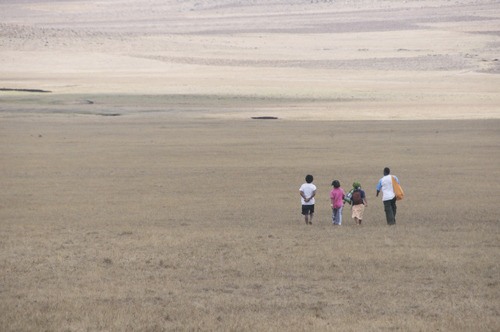By Cali Bagby
In the summer of 2009, Susan Bill of Lopez Island, rented a van and drove across Ethiopia’s landscape of desert and rocky terrain. After four hours, Bill’s adopted children, Marta, Solomon and Emebet knew they were finally on familiar ground, but still needed a little help.
They stopped the van and asked a farmer if he knew a man named Wondason. The farmer said, “Yes.” Wondason was the first man to plant trees in the village — trees that now sprout up like an island of green in a beige sea. Wondason was important to the children for another reason, he’s their father.
As soon as the farmer pointed in the direction of Wondason’s former home, Marta, Solomon and Emebet took off running toward the village.
Beside the rock-walled huts with grass roofs they embraced their grandparent, aunts, uncles and cousins who they hadn’t seen in years.
Now, nearly two years after that trip the Bill family is raising $10,000 to bring clean water for the Bill children’s “birth village” in Anasi, Ethiopia. Their fundraiser is a Full Moon Festival on July 15 at Arbordoun Farm.
An anonymous donor has pledged to match $5,000 worth of donations.
“We want to connect our village with this community,” Marta said. “I considered Ethiopia my home and when we left I felt displaced, but now I am going back and doing good things. I feel like my life has purpose.”
As a child, in Ethiopia, Marta rose at dawn. She and the women of the village walked the 15 minutes to the local spring. There they’d fill clay jugs with water and haul them back to the village. They made that trek three times a day.
Solomon spent his days shepherding the livestock.
Marta, now 18, Solomon, 17, and Emebet, 13, lived without electricity or running water, there wasn’t even a simple tool like a wheelbarrow.
In fact, there wasn’t a single wheel in the village.
“Its like going back to the dark ages,” Solomon said of his visit years later.
By 2001, both of their parents had passed away and in the span of six months Marta, Solomon and Emebet moved to three different orphanages.
During this time, Bill started the process of adopting a child with a company in Portland, Ore.
She was sent a picture of three kids. She had hoped to adopt two children, but when she saw all the siblings together she changed her mind.
So after 36 hours of traveling, Bill met 8-year-old Marta at the airport. They both described that day as frightening.
“What if you don’t bond?” said Bill. “It’s a scary first step.”
After 10 years of living as a family on Lopez and becoming modern American teenagers, the Bill children made the trip back to Ethiopia, back down the dusty road to the village. Their extended family had no idea what had happened to the kids after they went to the orphanage, so the reunion was a great surprise filled with joyful embraces.
For the three kids, two worlds suddenly collided.
Putting that experience into words is difficult, especially for Emebet, who left Ethiopian as a toddler with few memories. But a photo of her grandfather embracing her after a separation of ten years is proof that Ethiopia is also her home, a place where she and her siblings were loved, not just by their parents, but by an entire village.
After the first trip, Marta decided to visit the village again, for eight weeks. She lived in a hut, drank the water from the village spring and lived with her extended family. She did bring her cell phone and often made midnight calls back to Lopez.
“Sometimes I felt like I didn’t fit in and I felt so American,” said Marta. “Parts of the trip was a healing experience and a learning experience. You get to see how hard they work just to get through the day.”
Marta, Solomon and Emebet are in a sort of limbo as they spend time in Ethiopia and the U.S.
Marta wants to attend a college in Washington DC or California where there is a large Ethiopian population to work with on her language skills and more.
She also wants to live in Ethiopia someday, but she knows there will be the added pressure of caring for her family in the village.
“What would I be doing there if I wasn’t helping the village?” Marta asked.
But the Bills are already taking on that task.
After the trip, Marta created a slide show presentation about the village and the need for clean drinking water. With the help of the Lopez community including the Heller Family Foundation and Peggy Bill, they started planning for a fundraiser.
In September, Solomon will again visit Anasi and help with the construction of two concrete retaining structures with rocks and sand to filter the spring water. There also will be pipes, spigets and spouts to help distribute the water.
The plan is to raise the money in time for the water system by Oct.
For Marta, Solomon and Emebet, the work of building a bridge between two very distinct and different worlds continues.
“Lopez is where I live and Ethiopia is where I am from, that’s the best way I can explain it,” Solomon said.



